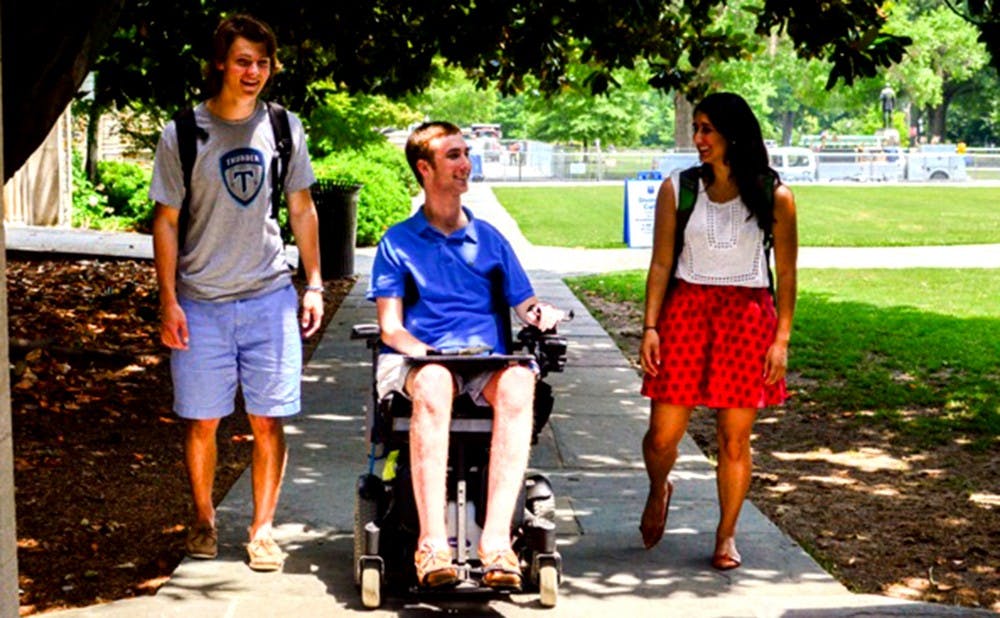Junior Jay Ruckelshaus—who was left paralyzed in both arms and legs after a diving accident the summer before his freshman year—is shining a spotlight on the experiences of students with disabilities.
After founding a nonprofit called Ramp Less Traveled to make higher education accessible to others with disabilities, Ruckelshaus is now bringing a national disability conference to Duke. His inspiration, he says, comes from his own experiences with transitioning to college.
“Even with my extremely supportive family and the great friends I had back at home, I found the process of getting back to Duke really overwhelming,” Ruckelshaus said. “So this re-entry process is basically an impossible task for students with disabilities who don’t have the support I did.”
First with his nonprofit and now with the conference, Ruckelshaus is attempting to provide this type of support to others. The "Beyond Disability, Beyond Compliance" national retreat will bring students, administrators and experts from across the country to discuss higher education opportunities for those with disabilities. Scheduled for the weekend of Oct. 22 at the Fuqua School of Business' Thomas Center, the retreat will examine how colleges accommodate students almost 25 years after the Americans with Disabilities Act.
Ruckelshaus said his ideas for the conference were met with overwhelming support from administrators, particularly Vice President for Administration Kyle Cavanaugh and Leigh Fickling, director of the Disability Management System.
“In a lot of ways, Jay epitomizes the description of a Duke student,” Cavanaugh said of Ruckelshaus, whom he has known for three years. “He’s really smart, with outrageous ambitions and fantastic ideas. How often do we get to really support these kinds of ideas?”
Fickling noted the conference is a valuable opportunity for discussion about ways that colleges can accommodate students with disabilities at a level above the mandated minimum. Colleges do what they must to stay within the lines of the ADA and other regulations, she said, but the goal should be to go beyond that—creating a unified campus experience for all students.
“This is a really exciting time for Americans to reflect on the progress we’ve made in incorporating people with disabilities into our society and to look at what more needs to be done,” Ruckelshaus said. “Duke in general has been extremely progressive with accommodating students with disabilities, so our goal isn’t for a specific policy change at Duke necessarily, but I’m excited for people to come together and form a sense of community.”
Ruckelshaus hopes that hearing policy experts and advocates from many universities will inspire students to start projects at their own schools to expand inclusion of people with disabilities. He also believes that improving higher education for people with disabilities can begin to combat their alarmingly high unemployment rates.
“What we want to do is explore,” Cavanaugh said. “How do we individually and collectively support individuals like Jay or another person who has similar aspirations but may also be facing enormous challenges?”
Ruckelshaus said he counted himself lucky because of the support he received, and resolved to show others with spinal cord injuries that higher education can be attainable for them. He decided to start Ramp Less Traveled in May 2013, but he initially grappled with determining the most effective strategy.
“I didn’t want to start something up for the hell of it,” Ruckelshaus explained. “Originally it was going to be a fundraising arm that would just give money to people, but that never really sat well with me. The heart of the issue isn’t money. You could throw a million dollars at some people and they still wouldn’t know what to do about it."
Instead, the organization focuses on developing mentor relationships in addition to providing financial support—helping students with disabilities navigate housing, dining, academics and social and sporting events to make the most of their college experience.
“Our goal is to do everything we can to bridge that gap between hospitals and colleges and to help students who’ve suffered really bad injuries get back to school,” Ruckelshaus said.
Ramp Less Traveled presented its first set of scholarships this year, providing funds to three college students with spinal cord injuries.
Ruckelshaus noted that he wants to show others not only the possibilities to thrive at college as a student with disability, but also the possibilities of thriving simply as a student.
“Obviously I’m a huge disability advocate, but that’s only one part of who I am. I’m a friend, a son, a basketball enthusiast and a political theory nerd, too,” Ruckelshaus said. “While I want the example I set to show how much can be done when you put your mind to it, it also doesn’t have to consume your life.”
Get The Chronicle straight to your inbox
Signup for our weekly newsletter. Cancel at any time.

